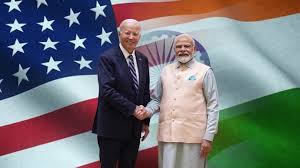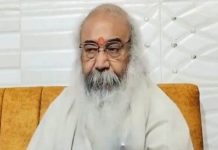There are sharp differences within the Indian establishment comprising former high-profile diplomats and security experts regarding the recent visit of the Indian Prime Minister Narendra Modi to the USA amid its election season by Gopal Misra

There are sharp differences within the Indian establishment comprising former high-profile diplomats and security experts regarding the recent visit of the Indian Prime Minister Narendra Modi to the USA.
A large number of scholars known for their in-depth studies of world affairs believe that Modi should have avoided his visit, especially on the eve of the highly controversial US presidential election. There are others, who are convinced that the India-US strategic partnership is a part of the role two democracies want to play immediately as well as in the coming decades.
Meanwhile, the media debates whether Modi’s three-day visit is going to improve the election prospects of the Democratic Party nominee Kamala Harris or her Republican Party nominee, Donald Trump, a former US President. It, however, appears to be too pedestrian, especially for the people who are aware of the political choices of the American electorate, including the voters of Indian origin. The initial assessment is that the visit of Modi to the US is not going to boost the prospects of either candidate. Also, he is not going to share any public platform with Kamala Harris and Donald Trump.
Modi’s visit to New York to address the UN General Assembly could be explained, especially in the context of seeking a peaceful solution to the ongoing fratricide between Russia and Ukraine. In the light of the recent decision of Dragon to ease the ongoing tension on the India-Tibet border in Eastern Ladakh, his decision to attend the QUAD summit at Denver has become quite relevant.
His participation in the summit, which was attended by President Joe Biden, has drawn worldwide attention. During the intense election campaign, some have criticized the meeting in the USA. Though there is a suggestion that the summit could have been avoided till the inauguration of the new president, it is also being stated that the QUAD is being endorsed by both the parties. Also, it was attended by the Japanese PM Fumo Kishida and the Australian PM Anthony Albabes. It means a continuous dialogue for the security of the Indo-Pacific region is being endorsed by the US political establishment.
Setting up an Agenda
Apart from the intense media debates and discussions, the participants of the high-profile summit have so far not cared to provide an all inclusive dialogue for cooperation among the countries of the region. The foreign affairs specialists in New Delhi are keen that the issue is not just of policing the region, but a broad spectrum approach is needed for addressing the immediate as well as long-term concerns.
It is hoped that the US-led coalition comprising Australia, India and Japan would be able to prepare a document after the inauguration of the new US President next year. Since the US has deep economic ties with China, the new president would be expected to define the American strategy in the region.
Meanwhile, China too has to redefine its role in geopolitics. It is necessary and also in the wider interests of a state, the ruling elite or the oligarchy, that churning for new ideas and strategies continue to redefine their narratives. Beijing too cannot remain wedded to the dated concepts and mischiefs. Therefore, the visit of the Indian Prime Minister Narendra Modi, that too just two months before the presidential poll, needs to be understood. The apprehension that if Kamala Harris makes it to the Whitehouse, her not-so-warm relations with Modi might adversely affect the US-India ties, is ill founded. The country’s interests are seldom affected by personal attitudes.
It cannot be denied that despite being less than two percent of the total voters, Indian voters do have strong voices in US politics. They are much more prosperous than the Jews, and have been contributing to all the sensitive key areas from Silicon valley, the American academia and even the White House.
It cannot be denied that inspite of pro-Modi rhetoric of Trump, the Democrats, especially a miniscule minority of the Roman Catholic, have always been the first choice of the voters of Indian origin.
The Indians, having elephantine memory, have never forgotten the crucial support of John F. Kennedy, the first Roman Catholic President of the US, to India during the 1962 Chinese invasion of her north-eastern region. Indians know that the Chinese premier, Zhou Enlai had telephoned the then Pakistani military dictator, Ayub Khan, to forcefully occupy Jammu and Kashmir, when most of the Indian troops were deployed in the northeastern region. However, it was Kennedy’s intervention that prevented Pakistan from attacking India.
The crisis and challenges
Each country has its own agenda and narrative, but during driving, a motorist has to make course corrections according to the existing ground realities. Since 1962, India’s foreign and strategic planning has undergone changes from the rhetoric of the Panchsheel or ‘the five principles’ for defining international affairs and non-alignment for maintaining world peace.
On January 31, 1992, the then Indian Prime Minister, P.V. Narasimha Rao had met the then US President, George W. Bush, in New York during the UN Security Council summit, and tried to convince him that the fragmentation of a democratic country like India would not be in the best interests of the free world, especially the US. Interestingly, just two days before the meeting, India had taken a bold step to establish full diplomatic ties with Israel.
Rao’s initiative was followed by initiating economic reforms. Two years later, Rao again visited Washington in May 1994, and sought American technologies and investments in India. However, compared to the Chinese initiative, it was not much. The successor of Mao Zedong, Deng Xiaoping had visited the US in 1979, laying the foundation of US-Chinese economic cooperation for the next 50 years during the presidency of Jimmy Carter. Carter writes in his diary that the visit had lit a spark that turned into a prairie fire. It, indeed, was a prophetic observation that transformed the world.
It may also be noted that in spite of being the paramount leader of a Communist country, Deng had married Zhuo Lin, daughter of a well-known industrialist of Yunnan. During his US visit, apart from Lin, he was also accompanied by the chairman of the Technology Commission, Fang Yi. Apart from signing agreements with various officials, he had met as many as 17 governors.
The colonial narrative
The main challenge before the US Administration in 2025 is how to reduce America’s dependence on China as it is the manufacturing hub of the American brands. Also, its approach towards India and other countries in the South Asian region continues like a colonial boss.
Most of the counties in the region have a colonial past. Since the conclusion of World War-II in 1945, the USA became a successor state of the erstwhile colonial powers of Europe, including the UK. Even 80 years after the end of colonial rule, a section of the US establishment, such as its judiciary and the deep state i.e the CIA have failed to weave in a new narrative with the rest of the world. Recently, it was quite ridiculous for an American court to summon India’s National Security Advisor, Ajit Doval. The support of the CIA to the Sikh extremists is quite known.
It is hoped that the new US President would be able to bring better coordination among the three key institutions, Pentagon, CIA and the foreign office.
Meanwhile, the love of Indians for the Roman Catholic continues for their commitment to the community and the poor. After Kennedy, Biden will be remembered for his friendly policies towards India.













